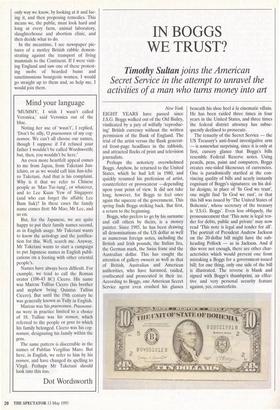Mind your language
`MUMMY, I wish I wasn't called Veronica,' said Veronica out of the blue.
Noting her use of 'wasn't', I replied, `Don't be silly, 0 praenomen of my cog- nomen. We can't all choose our names, though I suppose if I'd refused your father I wouldn't be called Wordsworth; but, then, you wouldn't be here.'
An even more heartfelt appeal comes to me from Japan, from Taketani Jun- ichiro, or as we would call him Jun-ichi- ro Taketani. And that is his complaint. Why is it that we refer to Chinese people as 'Mao Tse-tung', or whatever, and to Lee Kuan Yew of Singapore (and who can forget the affable Lee Bum Suk)? In these cases the family name comes first: Mr Mao, Mr Lee, and so on.
But, for the Japanese, we are quite happy to put their family names second, as in English usage. Mr Taketani wants to know the aetiology and the justifica- tion for this. Well, search me. Anyway, Mr Taketani wants to start a campaign to put Japanese names in English publi- cations on a footing with other oriental„ people's.
Names have always been difficult. For example, we tend to call the Roman orator (106-43 BC) Cicero. His name was Marcus Tullius Cicero (his brother and nephew being Quintus Tullius Cicero). But until the 19th century he was generally known as Tully in English.
Marcus was his praenomen. Praenomi- na were in practice limited to a choice of 18. Tullius was his nomen, which referred to the people or gens to which his family belonged. Cicero was his cog- nomen, designating his family within the gens.
The same pattern is discernible in the names of Publius Vergilius Maro. But here, in English, we refer to him by his nomen, and have changed its spelling to Virgil. Perhaps Mr Taketani should look into this too.
Dot Wordsworth


































































 Previous page
Previous page